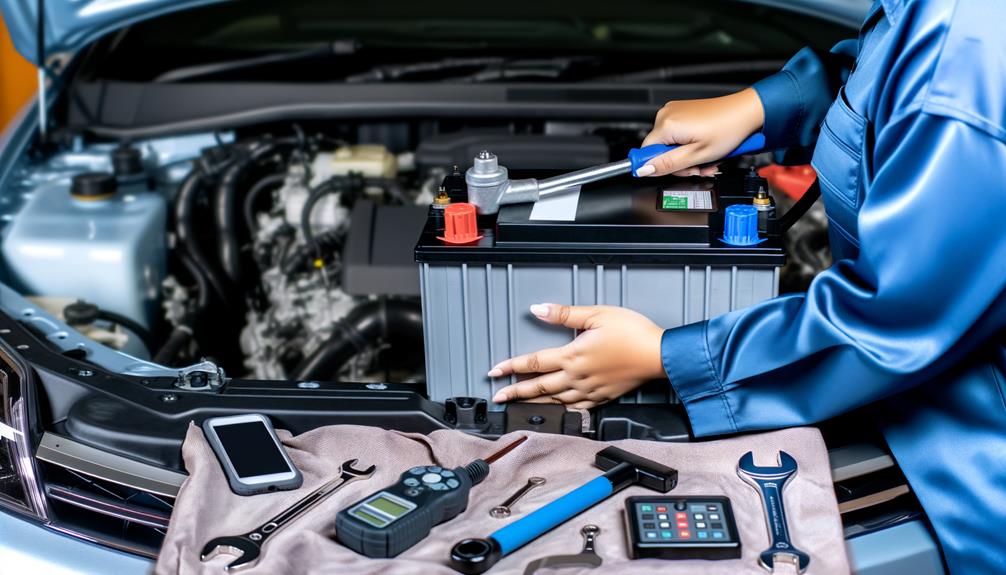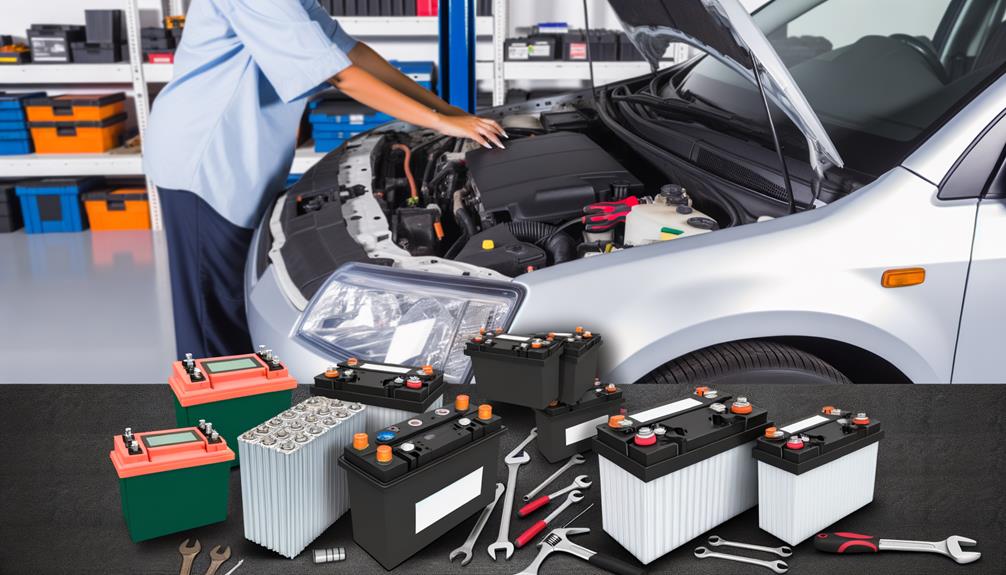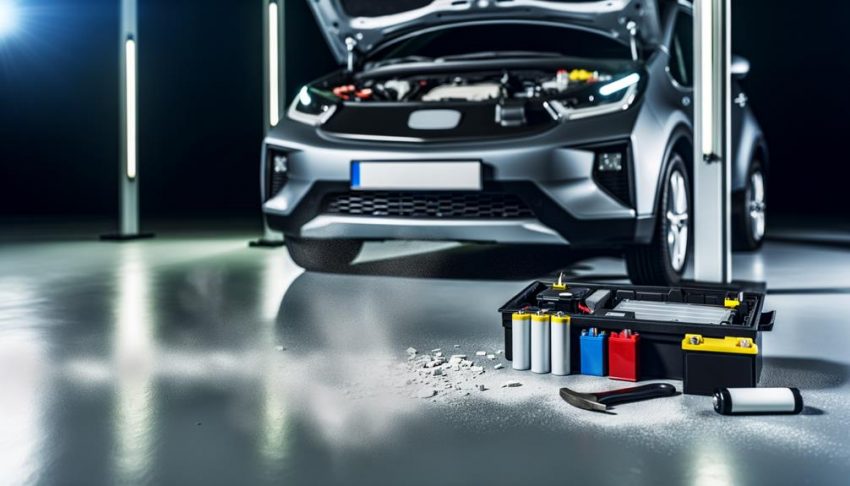When you're contemplating the cost of replacing a hybrid car battery, you're likely thinking it's a significant investment. Prices can range from $1,000 to $6,000, with most common models averaging under $3,000. But don't forget about the additional labor costs, which can add another $500 to $1,500. You might find yourself wondering if there are ways to cut these costs or if there's a need for a replacement at all. To navigate these expenses effectively, let's explore some practical strategies and key factors to ponder.
Contents
Costs and Factors
When it comes to replacing the battery in a hybrid car, understanding the costs and factors involved is vital. Battery replacement costs for hybrid vehicles can vary widely, typically ranging from $1,000 to $6,000. For most common hybrid models, you're looking at an expense of under $3,000 for the battery pack itself. However, it's not just the battery that you need to take into account; labor costs for installation can range from $500 to $1,500, and the process might take more than a day.
Several factors influence these costs. First, the make and model of your hybrid vehicle play a notable role. Luxury hybrid models often come with higher battery replacement costs due to the more expensive battery packs and intricate installation requirements. Mainstream brands tend to be more affordable in this regard.
Next, the type of battery and its chemistry are vital. Nickel-metal hydride (NiMH) batteries are generally cheaper compared to lithium-ion (Li-ion) batteries. This difference in battery chemistry can affect not only the price but also the performance and lifespan of the replacement battery.
Additionally, regional differences impact the total expenses. Labor costs can vary considerably depending on where you live, and the availability of parts might influence both the price and the time it takes to complete the replacement.
Understanding these variables helps you prepare financially and guarantees you make an informed decision when it's time to replace your hybrid vehicle's battery. Being aware of these factors can save you time, money, and potential headaches down the road.
Signs You Need Replacement
Recognizing the signs that your hybrid car's battery needs replacement can save you from unexpected breakdowns and costly repairs. One of the most telling indicators is a significant deterioration in your electric vehicle (EV) mode range. If you notice that your car isn't traveling as far on electric power alone, it might be time for a hybrid battery replacement.
Another red flag is if your gas engine fails to shut off when the vehicle is supposed to be operating in electric mode. This malfunction suggests that the hybrid battery isn't holding a charge as it should, indicating the need to replace it. Additionally, a noticeable drop in fuel economy can often point to a hybrid system malfunction, potentially linked to battery performance.
Pay close attention to how often your internal combustion engine kicks in. Increased reliance on the gas engine means the hybrid battery may not be functioning effectively, signaling a possible need for replacement. Regular monitoring for symptoms such as slow engine cranking or dashboard warning lights can also help you identify the need for battery replacement before total failure occurs.
Don't ignore those dashboard warning lights; they're designed to alert you to potential issues with your hybrid system, including the battery. Early identification and action can prevent more severe problems down the road. Being vigilant about these signs can guarantee your hybrid vehicle continues to run efficiently and effectively, saving you time, stress, and additional expenses related to hybrid battery replacement.
Maintenance Tips

Maintaining your hybrid car's battery is essential for guaranteeing ideal performance and extending its lifespan. Regular maintenance of the hybrid system, including tasks like filter cleaning and coolant replacement, can greatly prolong the life of your battery pack, pushing it well beyond the average 8 to 10 years.
One vital aspect of car care is keeping your hybrid battery charged, especially when your car is parked for extended periods. This helps prevent sulfation, a process that can degrade battery capacity and efficiency over time. Making sure your battery remains charged also maintains its range, contributing to better overall performance.
Temperature management plays an important role in battery health. Extreme temperatures, whether high heat or freezing cold, can negatively impact your battery pack's longevity. Try to park your hybrid vehicle in shaded or temperature-controlled environments to avoid these conditions and extend your battery's life.
Another effective maintenance tip is to employ battery reconditioning or balancing techniques. These methods can temporarily restore your battery's performance, offering a cost-effective solution before you consider a full replacement. Reconditioning can help balance the charge across the cells in your battery pack, leading to more consistent performance.
Lastly, utilizing specialized stores like AutoZone for your car care needs can guarantee you're getting quality products and services that support hybrid battery maintenance. From specific coolant types to high-quality filters, these stores provide the right tools to keep your battery pack in top shape.
Environmental Considerations
Environmental aspects for hybrid car batteries are paramount, especially as the push for sustainability gains momentum. When you reflect on the battery packs in hybrid vehicles, it's important to recognize the environmental impact throughout their lifecycle—from production to disposal.
Firstly, the production of hybrid battery packs involves the extraction of rare minerals, which can have significant environmental implications. Mining these materials often leads to habitat destruction, water pollution, and other ecological disturbances. However, many manufacturers are working hard to develop more sustainable battery technologies that reduce this ecological footprint.
Proper disposal of hybrid batteries is another critical environmental aspect. Improper handling can result in hazardous waste release, including toxic chemicals and heavy metals, which can contaminate soil and water. That's why recycling programs are essential. These programs not only minimize the environmental impact but also help recover valuable materials that can be reused in new batteries, supporting a circular economy.
Here are some key points to reflect on regarding the environmental aspects of hybrid battery packs:
- Recycling Programs: These help reduce waste and recover valuable materials.
- Sustainable Technologies: Manufacturers are innovating to lessen the ecological footprint of battery production.
- Proper Disposal: Critical for preventing hazardous waste release into the environment.
- Environmental Regulations: Promoting the use of recycled materials in new battery packs.
- Extraction of Rare Minerals: A significant concern due to its environmental impact.
Related Articles

If you're curious about extending your hybrid battery's lifespan, cutting replacement costs, or recognizing when it's time for a new battery, you'll find our related articles invaluable. These pieces cover practical cost-saving strategies, signs indicating battery wear, and insights into how long hybrid batteries typically last. Exploring these topics will equip you with the knowledge to make informed decisions and potentially save on future expenses.
Hybrid Battery Lifespan
When it comes to the lifespan of hybrid batteries, knowing what to expect and how to maintain them can make a considerable difference. Generally, hybrid batteries have a lifespan ranging from 8 to 10 years, although with proper care, some models can last up to 20 years. To get your hybrid battery to last as long as possible, it's crucial to take into account several factors that influence their longevity.
- Vehicle Make and Model: Different manufacturers have varying battery technologies and quality standards.
- Driving Habits: Frequent short trips or aggressive driving can stress the battery more than long, steady drives.
- Environmental Conditions: Extreme temperatures, either hot or cold, can degrade battery performance over time.
- Regular Monitoring: Keeping an eye on battery performance and addressing issues early can prolong its life.
- Charging Habits: Avoid letting the battery fully deplete or overcharging it; keep it in a moderate charge range.
Signs that your hybrid battery may need to be replaced include reduced electric vehicle (EV) mode range and noticeable drops in fuel economy. Regular maintenance and mindful driving can greatly extend your battery's operational life, saving you both time and money.
Cost-Saving Strategies
While understanding the factors that influence hybrid battery lifespan is essential, it's equally important to explore strategies for saving costs on replacements. First, check your warranty coverage. Many manufacturers offer warranties that cover hybrid car batteries for a specific period or mileage. This can greatly reduce your out-of-pocket expenses when it comes time to replace them.
Another cost-saving strategy is to shop for aftermarket batteries. These options often provide competitive pricing without sacrificing quality, helping you manage the cost to replace your car batteries more effectively. Additionally, consider refurbished or used batteries. These can be a budget-friendly alternative, offering the functionality you need at a fraction of the cost of new units.
You might also look into partial replacements. Sometimes, only individual cells of the battery pack need replacing, which can notably lower costs while still improving battery performance. Finally, don't forget to compare labor quotes from multiple repair shops. Labor costs can vary widely depending on the location and shop pricing, so getting multiple quotes can reveal considerable savings.
Replacement Indicators
Many hybrid car owners often overlook the subtle signs that indicate their battery needs replacing. Knowing these replacement indicators can save you from unexpected breakdowns and costly repairs. Hybrid batteries typically last 8 to 10 years or around 100,000 miles, but this varies by make and model. Here are some key signs to watch out for:
- Deterioration in EV Mode Range: If you notice a significant drop in how far your car can go on electric power alone, it's a clear indicator your hybrid battery is failing.
- Decreased Fuel Economy: When your fuel mileage starts to dip without any other apparent reason, it's time to evaluate the health of your hybrid battery.
- Gas Engine Runs Constantly: If the gas engine doesn't shut off during electric mode, it suggests your battery isn't holding a charge as it should.
- Predetermined Replacement Intervals: Some vehicles have specific replacement schedules, like 10 years or 150,000 miles. Always stay informed about your car's recommendations.
- Regular Monitoring: Routinely check battery performance to catch issues early, preventing expensive repairs.
Cost-Saving Strategies
When considering replacement batteries for your hybrid car, you've got a few cost-saving strategies to keep in mind. Check if your battery is still under warranty, as it could greatly reduce your out-of-pocket expenses. Additionally, exploring aftermarket or refurbished battery options can offer substantial savings without sacrificing performance.
Warranty Coverage Benefits
Understanding your hybrid car's warranty coverage can greatly impact your budget and peace of mind. Many hybrid batteries come with warranties spanning 8 to 10 years or up to 100,000 miles. This coverage can notably reduce costs if you need to replace a hybrid battery within this period. Some manufacturers even offer extended warranties, adding extra years or mileage for further financial protection.
To maximize your cost-saving potential, it's essential to be familiar with the specific warranty terms for your hybrid battery. This knowledge can help you determine if you're eligible for a replacement at minimal or no cost, potentially saving thousands.
Certain states mandate minimum warranty durations for hybrid batteries, which can be particularly beneficial. To make sure you don't inadvertently void your warranty, keep all service records and maintain your vehicle according to manufacturer guidelines.
Key benefits of warranty coverage include:
- Extended financial protection through additional years or mileage.
- Cost reduction if the battery fails within the warranty period.
- Legal protections in states with mandatory warranty durations.
- Peace of mind knowing potential expenses are covered.
- Maintenance compliance to avoid voiding the warranty.
Staying informed about your warranty coverage can greatly ease the financial burden when replacing a hybrid battery.
Aftermarket Battery Options
While warranty coverage plays a notable role in managing the costs associated with hybrid battery replacement, there are other strategies that can further alleviate financial burdens. One such strategy is opting for aftermarket batteries. These batteries, which are not made by the original equipment manufacturer (OEM), can be considerably less expensive, often ranging from $1,000 to $3,000 depending on your vehicle model and battery type.
Choosing aftermarket batteries doesn't mean compromising on quality. Many aftermarket options offer reliable performance and can be a practical alternative to OEM batteries, which tend to be more costly. Additionally, some manufacturers even provide warranties on their aftermarket products, giving you peace of mind.
Another cost-saving tactic is to shop around for multiple labor quotes for the battery installation. Labor costs can vary widely, from $500 to $1,500, so comparing prices among different mechanics or service centers can yield substantial savings. Remember to weigh the expertise and reputation of the service provider, not just the price.
Refurbished Battery Savings
Refurbished hybrid batteries can be a game-changer in reducing replacement costs, often priced between $1,000 to $3,500 compared to the $1,000 to $6,000 range for brand-new batteries. Opting for refurbished batteries offers an affordable alternative, especially when sourced from reputable suppliers. These batteries can deliver reliable performance without breaking the bank.
One major advantage of refurbished batteries is that they often come with warranties, giving you peace of mind and potential savings on future repairs or replacements. This is particularly beneficial for older hybrid models, where new battery availability might be limited or prohibitively expensive.
To guarantee you're getting a quality product, it's essential to confirm that refurbished batteries have been properly reconditioned and tested to meet safety and performance standards.
Here are some key benefits:
- Cost Savings: Noticeably lower prices compared to new batteries.
- Warranties: Many refurbished batteries include warranties.
- Availability: Easier to find for older hybrid models.
- Environmental Impact: Reusing batteries reduces waste.
- Performance: Can provide reliable performance if sourced from reputable suppliers.
Frequently Asked Questions
How Much Does It Cost to Replace a Battery in a Hybrid Car?
You're looking at replacement costs ranging from $1,000 to $6,000, depending on battery types. Installation costs add another $500 to $1,500. Total expenses can reach $6,666, influenced by your vehicle's make, model, and regional labor rates.
Is It Worth Replacing a Hybrid Battery?
Yes, it's worth replacing a hybrid battery. Improved battery performance and various replacement options can restore your vehicle's efficiency and extend its lifespan, making it a valuable investment, especially if your warranty covers the cost.
How Long Do the Batteries Last in a Hybrid Car?
You're wondering about battery lifespan in hybrid technology. Typically, hybrid batteries last 8-10 years or 100,000-150,000 miles. With proper care, some can reach up to 20 years. Monitoring performance and maintenance are key to extending longevity.
Can You Drive a Hybrid Car if the Battery Dies?
If your hybrid battery fails, driving alternatives are limited. You'll likely experience reduced performance and fuel efficiency. Some models might not run at all without a functional battery, risking further engine damage and potential towing.
Conclusion
In conclusion, replacing a hybrid car battery can be a significant investment, typically ranging from $1,000 to $6,000, plus labor costs. Keep an eye out for signs you need a replacement and follow maintenance tips to extend battery life. Considering aftermarket or refurbished options, along with warranty coverage, can help save money. Being informed about these factors guarantees you make cost-effective and environmentally friendly choices for your hybrid vehicle.
